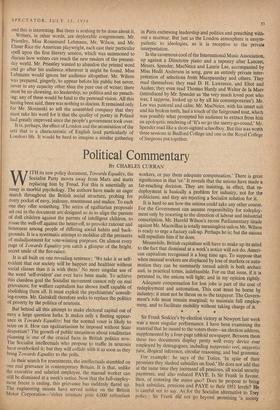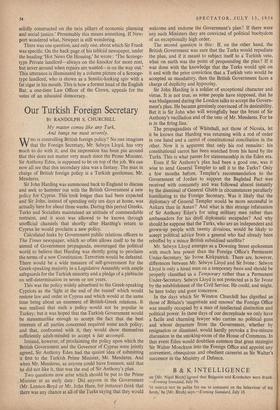Political Commentary
BY CHARLES CURRAN WITH its new policy document, Towards Equality, the Socialist Party moves away from Marx and starts replacing him by Freud. For this is essentially an essay in morbid psychology. The authors have made an eager search throughout the British social structure, probing for every pocket of envy, jealousy, resentment and malice. To each one they offer something. The series of egalitarian proposals set out in the document are designed so as to align the parents of dull children against the parents of intelligent children, to rouse the well-off against the better-off, to provoke rancour and bitterness among people of differing social habits and back- grounds. It is a systematic attempt to mobilise all the pressures of maladjustment for vote-winning purposes. On almost every page of Towards Equality you catch a glimpse of the bright, secret smile of the fire-raiser.
It is all built on one revealing sentence: 'We take it as self- evident that our society will be happier and healthier without social classes than it is with them.' No more singular use of the word `self-evident' can ever have been made. To achieve this classless goal the Socialist movement cannot rely on real grievances; for welfare capitalism has shown itself capable of abolishing them all. It must exploit the psychiatrists' consult- ing-rooms. Mr. Gaitskell therefore seeks to replace the politics of poverty by the politics of neurosis.
But behind all this attempt to make electoral capital out of envy a large question lurks. It makes only a fleeting appear- ance in Towards Equality; but the normal voter is likely to seize on it. How can egalitarianism be imposed without State despotism? The growth of public uneasiness about totalitarian planning is one of the crucial facts in British politics now. The Socialist intellectuals who propose to traffic in neurosis have overlooked it; but they will collide with it as soon as they bring Towards Equality to the polls. workers, or pay them adequate compensation.' There is great significance in that 'or.' It reveals that the unions have made a far-reaching decision. They are insisting, in effect, that re- deployment is basically a problem for industry, not for the politicians; and they are rejecting a Socialist solution for it.
It is hard to see how the unions could take any other course. For the Government can assume responsibility for redeploy- ment only by resorting to the direction of labour and industrial conscription. Mr. Harold Wilson's recent Parliamentary tirade against Mr. Macmillan is totally meaningless unless Mr. Wilson is ready to urge a factory call-up. Perhaps he is; but the unions will repudiate him if he does.
Meanwhile, British capitalism will have to make up its mind to the fact that dismissal at a week's notice will not do. Ameri- can capitalism recognised it a long time ago. To suppose that when manual workers are displaced by loss of markets or auto- mation they can be summarily turned adrift is both archaic and, in practical terms, indefensible. For on that issue, if it is persisted in, the unions will fight; and in my opinion rightly.
Adequate compensation for lost jobs is part of the cost of redeployment and automation. This cost must be borne by industry; it must not be thrust on to the taxpayer. The Govern- ment's role must remain marginal; to maintain full employ- ment, and to facilitate mobility without taking charge of it.
Sir Frank Soskice's by-election victory at Newport last week was a most singular performance. I have been examining the material'that he issued to the voters there—an election address, supplemented by a four-page tabloid newspaper. Between them these two documents display pretty well every device ever employed by demagogues, including suppressio yeti, suggestio fain, illogical inference, circular reasoning, and bad grammar. solidly constructed on the twin pillars of economic planning and social justice.' Presumably this means something. If New port wondered what, Newport is still wondering.
There was one question, and only one, about which Sir Frank was specific. On the back page of his tabloid newspaper, under the heading 'Hot News On Housing,' he wrote : 'The Scrooge- type Private landlord—always on the knocker for more rent, but never around when repairs are wanted—is on the way out.' This utterance is illuminated by a column picture of a Scrooge- type landlord, who is shown as a Semitic-looking spiv with a fat cigar in his mouth. This is how a former head of the English Bar, a one-time Law Officer of the Crown, appeals for the votes of an educated democracy.



































 Previous page
Previous page